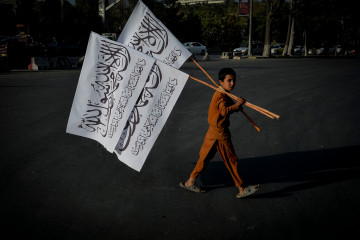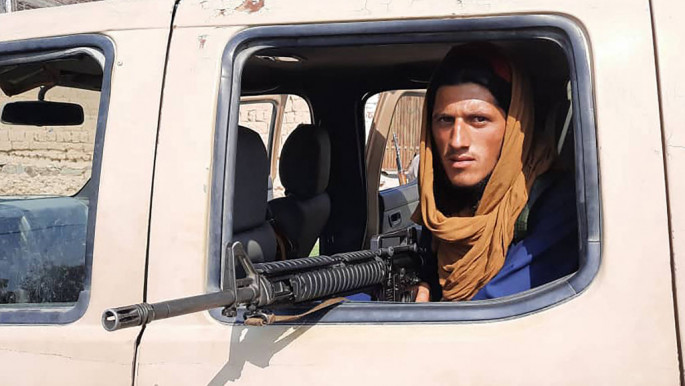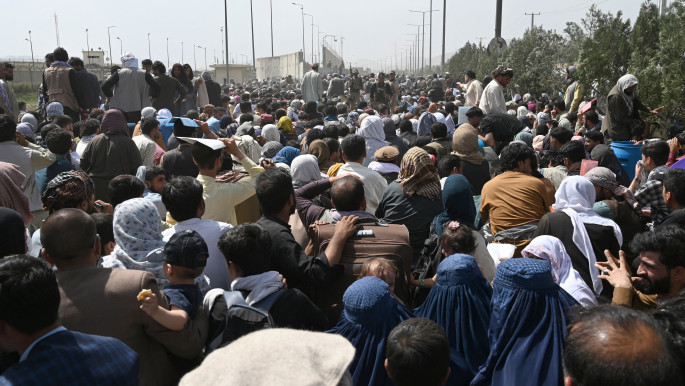

On 15 August, the Taliban seized control of Kabul. Afghan President Ashraf Ghani fled to the United Arab Emirates (UAE) and the Islamic Emirate of Afghanistan was restored nearly two decades after its overthrow in November 2001.
Although no country has recognised the Islamic Emirate as Afghanistan’s legitimate government, the Taliban’s triumph has polarised the international community.
The United States, Britain, and the European Union (EU) have refused to recognise the Taliban’s legitimacy. Countries in Afghanistan’s regional neighbourhood, such as China, Russia, Iran, and Pakistan, have left the door open to engagement with a Taliban regime.
India, by contrast, has embraced an ambiguous policy towards political change in Afghanistan, which subtly contrasts with its decades-long policy of viewing the Taliban as a wholly illegitimate supporter of terrorism.
"The future of the Taliban's interactions with its regional neighbourhoods will ultimately depend on its conduct"
China
China has been especially explicit about the flexibility of its Afghanistan policy. Chinese Foreign Ministry spokeswoman Hua Chunying vowed to deepen “friendly and cooperative” relations with the Taliban after its triumph in Kabul.
While Chinese media outlets have promoted anti-American rhetoric to accompany this stance, Beijing’s embrace of the Taliban is not primarily driven by anti-Westernism.
US Secretary of State Anthony Blinken’s claims that China’s role in Afghanistan could be positive, and British Foreign Secretary Dominic Raab’s claims that China and Russia could moderate the Taliban underscore this point. Instead, China’s involvement in Afghanistan is driven by national security and geo-strategic imperatives.
From a national security standpoint, China wants to ensure that the Taliban does not collaborate with the East Turkestan Islamic Movement or foment extremism in Xinjiang. From a strategic vantage point, two factors stand out.
|
|
First, China believes that cultivating positive relations with the Taliban will allow the Belt and Road Initiative (BRI) to enter Afghanistan and guard against Taliban-sponsored attacks against the China Pakistan Economic Corridor (CPEC).
To achieve this end, China regularly engages with the Taliban, and Chinese Foreign Minister Wang Yi described the Taliban as a “decisive military and political force” during a meeting with Mullah Baradar last month in Tianjin.
Second, China wishes to enter Afghanistan’s mining sector and views cordial relations with the Taliban as the easiest path to preferential contracts. Taliban spokesperson Zabihullah Mujahid has refused to rule out giving China priority access to lucrative Afghan investments, stating that “these issues will be considered later, so it is too early to say.”
"China has been especially explicit about the flexibility of its Afghanistan policy"
China is especially interested in Afghanistan’s reserves of rare-earth metals, as control over these reserves gives it leverage over American technology companies in the event of an escalated US-China trade war. China’s Metallurgical Group Corp has also secured a contract to develop the Mes Anyak copper mine which will take effect if Beijing recognises the Taliban’s legitimacy.
Russia
Russia is less likely than China to swiftly forge a partnership with Afghanistan’s new authorities, as it designated the Taliban as a terrorist organisation in 2003 and wishes to accommodate the concerns of Central Asian countries about a spillover of terrorism.
Earlier this month, Russia held a series of military drills with Tajikistan and Uzbekistan, which included 2,500 troops and 500 military vehicles. Russia has also pledged to finance a new outpost on the Tajikistan-Afghanistan border, which is an especially pronounced area of insecurity.
These drills further enhance Russia’s influence in Central Asia, which has faced prospective competition from China and has been mired by the Eurasian Economic Union’s underwhelming progress towards regional integration.
Russia also hopes that its active role in managing the Taliban’s threat to regional security will be appreciated by Western powers. Since the Taliban’s seizure of Kabul, Moscow has emphasised its commitment to regional security in consultations with France, the US, Italy, and Germany.
Nevertheless, Russian officials have signalled their intention to establish positive relations with the Taliban. Russian Ambassador to Afghanistan Dmitry Zhirnov has praised the Taliban for improving the security situation in Kabul and claimed that resistance to the Islamic Emirate is futile.
Russian President Vladimir Putin’s envoy to Afghanistan Zamir Kabulov praised the Taliban as a more trustworthy partner than the Afghan government. These overtures reflect six years of regular diplomatic interactions, which began with Russia’s intelligence sharing with the Taliban against the Islamic State (IS) in 2015 and were augmented by the Moscow-format negotiations.
"Russian officials have signalled their intention to establish positive relations with the Taliban"
Iran
Iran appears willing to accommodate the Taliban’s takeover and has celebrated the US withdrawal as a victory for the Afghan people. Iranian reformists have been much more critical of the Islamic Emirate’s re-creation and have pressured President Ebrahim Raisi to accept larger numbers of Afghan refugees.
The negative overhang of Iran-Taliban tensions during the 1990s, which included the August 1998 killing of 10 Iranian diplomats and a journalist by the Taliban in Mazar-i-Sharif, continues to trigger ill will in Tehran.
Although Raisi will work around these domestic disagreements, he will likely try to expand Iran’s diplomatic involvement in Afghanistan and potentially leverage its relationship with Russia to enter the extended troika. Iran’s impending membership in the Shanghai Cooperation Organisation (SCO) could further amplify its role in managing the security fallout of the war in Afghanistan.
|
|
Pakistan
Pakistan’s response to the Taliban takeover has featured ebullient official rhetoric and behind-the-scenes alarm. Pakistani Prime Minister Imran Khan’s claims that Afghanistan has broken “the shackles of slavery” and his special assistant Raoof Hasan’s praise of Afghanistan’s smooth transition from rule by a “corrupt Afghan government” to the Taliban have caused controversy.
Pakistan also views its participation in the extended troika meetings, which include the US, Russia, and China, as an opportunity to highlight its indispensability in Afghanistan to great powers.
However, the Taliban’s takeover of Afghanistan comes with considerable risks for Pakistan and Islamabad is unlikely to emulate its wholehearted support for the Islamic Emirate from 1996-2001.
Beyond the risk of terrorism, the Taliban’s triumph has reduced the value of Pakistani bonds, which exacerbates Pakistan’s debt crisis and deters foreign investment.
"Pakistan's response to the Taliban takeover has featured ebullient official rhetoric and behind-the-scenes alarm"
India
India viewed the Taliban’s takeover of Afghanistan to be a highly pernicious development, as New Delhi had close ties with Ghani and views the Taliban as a proxy of Pakistan. In contrast to Russia, which trusted Taliban guardianship of its diplomats, India immediately took steps to evacuate its embassy in Kabul.
The Taliban’s halt of overland trade between India and Afghanistan via Pakistan, which has been widely condemned in the Indian media. Nevertheless, there are signs that India-Taliban tensions could de-escalate over time.
Indian Foreign Minister S Jaishankar has emphasised India’s ties with the Afghan people and has remained ambiguous about whether New Delhi will engage with the Taliban.
The Taliban, for its part, has described Kashmir as an internal bilateral issue, and insisted that it does not wish to be dragged into the India-Pakistan rivalry.
This rhetoric suggests that the Taliban might not try to ratchet up tensions with India in the near term, especially as Prime Minister Narendra Modi is chairing UN Security Council meetings on Afghanistan.
The future of the Taliban’s interactions with its regional neighbourhoods will ultimately depend on its conduct.
"India viewed the Taliban's takeover of Afghanistan to be a highly pernicious development, as New Delhi had close ties with Ghani and views the Taliban as a proxy of Pakistan"
If the Taliban acts on its pledge to create an inclusive government in Afghanistan, regional powers led by China, Pakistan and Russia could informally or officially recognise its legitimacy.
Should the Taliban try to cement its rule through coercion and re-establish its links to transnational terrorist groups, it will suffer from acute international isolation.
As the Taliban progresses towards establishing a governance framework in Afghanistan, regional powers will be watching with trepidation.
Samuel Ramani is a tutor of politics and international relations at the University of Oxford, where he received a doctorate in 2021. His research focuses on Russian foreign policy towards the Middle East
Follow him on Twitter: @SamRamani2






 Follow the Middle East's top stories in English at The New Arab on Google News
Follow the Middle East's top stories in English at The New Arab on Google News


